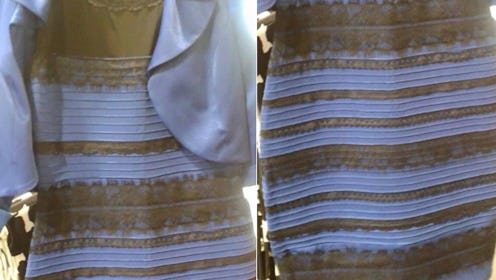Life
#TheDress Made Us All More Open Minded

If you were on the Internet at all last week, you doubtlessly know all about The Dress — including the fact that no one can agree what color it is (even though it is clearly white and gold). But despite tearing the entire Internet apart at the seams on the very day we should have been united in our net neutrality victory, it turns out that The Dress might have actually been good for us: According to a new study, optical illusions make people more open minded. Which might seem unlikely given how quickly the web divided into factions and communicating exclusively in caps lock... but apparently it's true. Science trumps all. After all, was it not science that eventually explained the war-inducing mystery of The Dress?
But I digress. Back to this whole optical illusions being good for us business:
The Experiment:
The experiment, conducted by researchers at the University of Alabama, involved 200 student participants who were assigned to one of four groups. Some students read about a psychological concept called "naive realism" (that is, the human tendency to believe that how we perceive the world is how it is, objectively) and then saw several optical illusions, with the effects explained. Students in another group only read the explanations without seeing the illusions; meanwhile, students in the remaining two groups either took a verbal intelligence test or read about chimpanzees.
Students then read several vignettes about different people whose characters and motives were deliberately up for interpretation ("assertive" vs. "hostile, for instance).
The Results:
The researchers found that the participants who read about naive realism and experienced the optical illusions were less firm in the their judgments of these characters and more open to alternate interpretations. Those who only read about naive realism did not show the same tendency.
"In sum," the researchers said, "exposing naive realism in an experiential way seems necessary to fuel greater doubt and openness."
The Takeaway:
The concept of naive realism is pretty well embedded in our brains, and probably for good reason. From a survival standpoint, after all, second guessing your perceptions isn't going to serve you well if, say, your perception is that a lion is running towards you very fast and probably wants to eat you. But when it comes to living in complex social groups, the idea that what we see and hear represents the objective truth can become a lot more problematic. Why? For the simple reason that different people perceive things in different ways. The brain is a complicated thing, and the process of turning raw data from your senses into a coherent picture of the world is way more difficult than we tend to think, and way more subjective and variable.
Case in point: The Dress.
So... What Does This Mean For The Dress?
Fortunately, the Great Dress War of 2015 has ended (even the memes have gotten kind of tired at this point now that corporations are trying to get in on the game). But the fact that we as a society basically spent a solid 24 hours with an optical illusion on our collective radar was probably good for us — especially since, before the dressmaker weighed in and proved which colors were "correct," there was no way to prove whose perception was right. The whole thing forced us to recognize that other people can see the world totally differently.
And the fact that we actually had a national conversation about that is really, really cool. Who knows? Maybe if we kept having those conversations, Congress would eventually get something done.
What can I say, I'm an optimist.
Image: swiked/Tumblr; Giphy